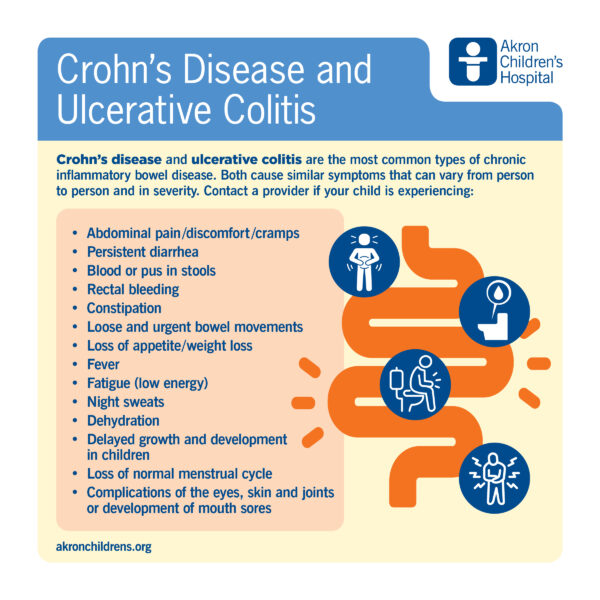
Left untreated, inflammatory bowel disease can cause growth delays, anemia or irreversible bowel damage and a higher risk of developing colon cancer.
Crohn’s disease and ulcerative colitis are both forms of inflammatory bowel disease (IBD) that result in inflammation in the gastrointestinal (GI) tract. Ulcerative colitis affects the colon (large intestine) while Crohn’s disease can affect anywhere in the GI tract.
Pediatric gastroenterologist Dr. Kevin Watson says that being diagnosed with one of these conditions can be mentally and physically exhausting for patients suffering from weight loss, abdominal pain, diarrhea, fatigue, anemia and poor growth – all characteristics of the disorders.
“Most cases of IBD are diagnosed between 15 and 35 years of age, but there are cases of patients diagnosed much younger,” said Dr. Watson. “Symptoms such as those mentioned above should be evaluated for IBD. While it’s rare to see IBD in kids under age 6, the incidence has been rising.”
Left untreated, patients can develop growth delays, anemia or irreversible bowel damage and are at higher risk of developing colon cancer. IBD can also cause symptoms outside of GI tract such as with the kidneys, joints and eyes.

Dr. Watson says the best way to help your child cope with an IBD diagnosis is to talk about it.
“No question is too embarrassing; I talk about poop all day!” he says. “Kids often have concerns about bowel habits including frequency and increased sounds coming from the GI tract especially during school. They are worried about what to tell people (and who to tell) about their condition.”
Parents can work with their child’s school to develop a 504 education plan that allows accommodations in school for extra bathroom breaks and/or absences for clinic visits or illness.
Another way parents can help their kids is to encourage a healthy lifestyle through stress management, diet and exercise. The Gastroenterology clinic at Akron Children’s has dietitians who can meet with families to answer questions related to nutrition and healthy eating habits.

Dr. Kevin Watson
“Stress can affect symptoms so taking measures to help improve stress, like increasing physical activity as their health improves, can be beneficial. Being diagnosed with IBD itself can be extremely stressful,” said Dr. Watson. “Fortunately, Akron Children’s has a medical coping clinic that works with children who are coping with a new illness and the changes associated with it.
“IBD will always be a part of their life, but the goal is to not let it define them and take over their whole life,” he says. “Kids should be able to do activities and things they want to do without IBD limiting them.”
For more information on inflammatory bowel disease, visit us online or call 330-543-2778 to set up an appointment with one of our gastroenterology providers.










